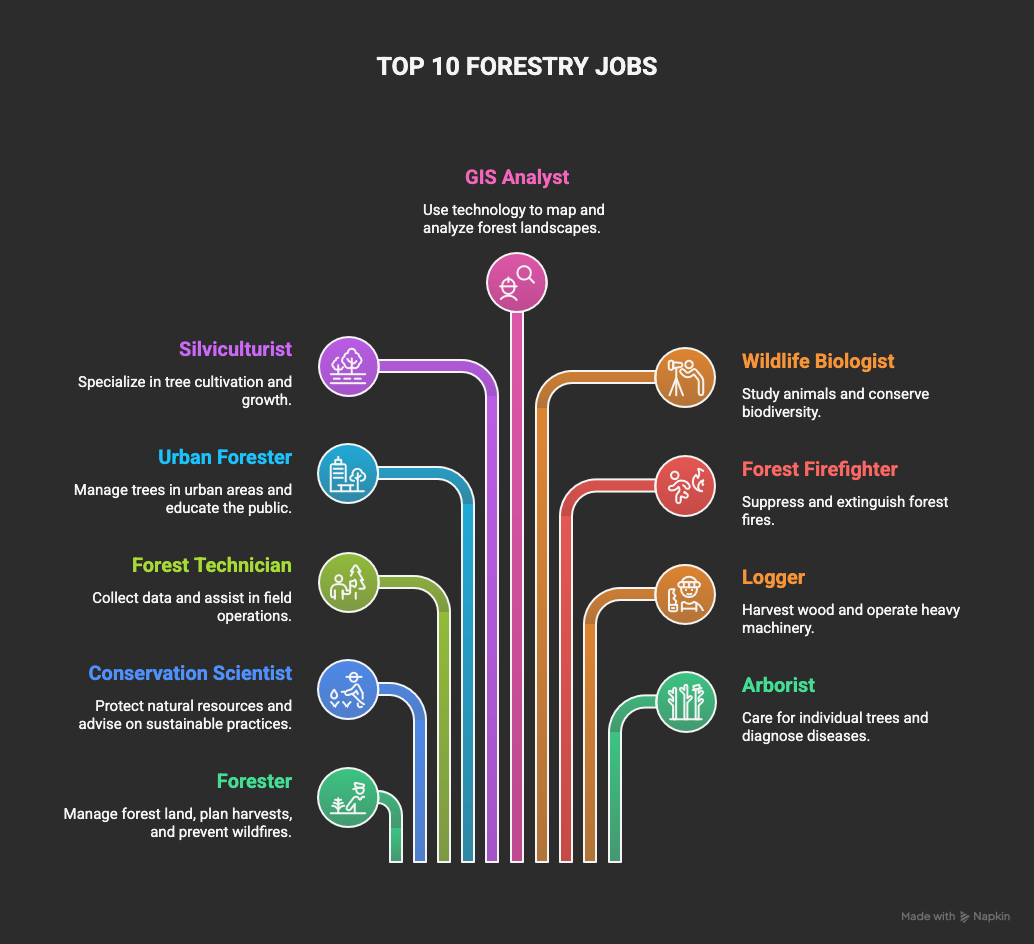What are the best forestry careers for sustainability-focused professionals?
Forestry careers combine science, stewardship, and sustainability — from foresters managing vast woodlands to GIS analysts using data to protect ecosystems. Whether you’re passionate about conservation, wildlife, or urban ecology, this field offers diverse paths that balance environmental responsibility with career growth. With salaries ranging from $40,000 to $90,000+, these roles let you make a tangible impact on climate resilience, biodiversity, and community well-being through hands-on, meaningful work.
The forestry and conservation industry quietly sustains nearly a million American jobs, with over 925,000 people employed and $80 billion paid in annual wages.
Behind those numbers are professionals who balance the demands of progress with the urgency of preservation.
From the forester planning sustainable harvests to the GIS analyst mapping ecosystems, each role contributes to safeguarding one of our planet’s most essential resources - forests.
If you’re drawn to meaningful, hands-on work that bridges science, sustainability, and impact, here are 10 careers that keep our forests, and our future, thriving.
1. Forester
Foresters are responsible for the overall management of forest land, balancing the ecological health of forests with the economic demands for their resources.
They create and implement long-term management plans for public and private forest lands.
This involves everything from planning timber harvests and reforestation efforts to managing wildlife habitats and preventing wildfires.
To step into this role, you'll typically need a bachelor's degree in forestry with strong analytical and decision-making skills. A good level of physical fitness for fieldwork is another requirement for this role.
In terms of compensation, the U.S. Bureau of Labor Statistics reports the median annual wage for foresters is $67,330, with the top earners making over $92,550.
Also Read: How to build a career in sustainability?
2. Conservation Scientist
If your passion lies in protecting and preserving the natural world, a career as a conservation scientist could be your calling.
These professionals work to manage, improve, and protect natural resources. They advise landowners and government agencies on sustainable land use and conservation practices.
A bachelor's degree in a field like forestry or environmental science is the starting point, but many roles, especially in research, require a master's degree or even a Ph.D.
The median annual wage for conservation scientists is around $62,410, according to BLS.
3. Forest and Conservation Technician
Working alongside foresters and conservation scientists, technicians are the hands-on heroes of the forest.
They are out in the field collecting data, measuring trees, marking timber for harvest, and assisting in fire suppression and prevention efforts.
It's a physically demanding but incredibly rewarding job.
An associate's degree in forestry or a related field is often the ticket into this profession, with a median salary of $40,540.
Also Read: How to make winning resume for wildlife management jobs?

4. Urban Forester
Not all forests are in the wilderness. Urban foresters manage the trees and forests within a city or community.
They are responsible for planting and maintaining trees, developing urban forestry management plans, and educating the public about the importance of trees in our cities.
A bachelor's degree in urban forestry, arboriculture, or a related field is typically required. And a certification from the International Society of Arboriculture (ISA) can also be beneficial.
Salaries for urban foresters generally range from $50,000 to $80,000 annually.
5. Silviculturist
A silviculturist is a highly specialized forester who focuses on the science and art of growing and cultivating forest trees.
They are experts in understanding how different environmental factors affect tree growth and health, and they apply this knowledge to manage forests for specific objectives, such as timber production or habitat restoration.
A bachelor's degree in forestry with a specialization in silviculture is the minimum requirement, with advanced degrees needed for research roles.
This expertise is well-compensated, with average salaries around $65,610 per year.
6. Forest Data and GIS Analyst
If you have a passion for numbers and the outdoors, this career, which blends fieldwork with high-tech analysis, could be a perfect fit.
Forest Data and GIS Analysts are the tech wizards who use Geographic Information Systems (GIS) and remote sensing technology to map, monitor, and analyze forest landscapes.
Their work is vital for sustainable forest management, wildfire modeling, and conservation planning.
A bachelor's degree in forestry, geography, or a related field with strong GIS skills is essential.
Salaries for these analysts typically range from $60,000 to $90,000.
7. Wildlife Biologist
For those who are fascinated by the creatures that call the forest home, a career as a wildlife biologist is a dream come true.
They study animals in their natural habitats, researching their populations, behaviors, and interactions with the environment. Their work is crucial for managing wildlife populations and conserving biodiversity.
For aspiring candidates, a bachelor's degree in wildlife biology or a related field is the basic requirement.
According to Indeed, the median annual wage for wildlife biologists is $67049.
8. Forest Firefighter
Forest firefighters are responsible for suppressing and extinguishing fires in forests and other wildland areas.
They work in teams to create firebreaks, operate fire hoses, and drop water and fire retardant from aircraft.
It's a physically and mentally demanding job that requires courage, teamwork, and a deep commitment to public service.
You'll need to be at least 18 years old, have a high school diploma, and pass a strenuous physical fitness test and training program.
The average salary for a forest firefighter can range from $57,053 to $92,738 per year, with opportunities for overtime pay during fire season.

9. Logger
Loggers are the backbone of the timber industry, responsible for harvesting the wood that we use for everything from building homes to making paper.
It's a challenging, hands-on job that requires skill in operating heavy machinery and a strong commitment to safety.
While formal education isn't typically required, extensive on-the-job training is essential.
The median annual wage for logging equipment operators is $59,477.
10. Arborist
Think of an arborist as a "tree doctor." They are experts in the care of individual trees, providing services like pruning, planting, and diagnosing and treating diseases and pests.
Arborists work in a variety of settings, from residential yards to city parks.
While you can start with on-the-job training, many arborists pursue an associate's or bachelor's degree in arboriculture or a related field, and certification from the International Society of Arboriculture (ISA) is highly valued.
The median annual wage for arborists is $53,611, according to Glassdoor.
Also Read: How to build a career in agriculture?
To Sum Up
Whether you’re drawn to the science of conservation, the strategy behind forest management, or the thrill of working outdoors, a career in forestry offers purpose as much as progress.
But standing out in this field takes more than passion, it takes preparation.
That’s where Hiration can help.
Our AI-driven platform supports aspiring professionals in creating polished resumes, practicing interviews, and showcasing their expertise in LinkedIn with confidence.
So when opportunity knocks, whether it’s your first field role or a step toward leadership, you’ll be ready to answer it.
Forestry Careers — FAQ
What degree is required for most forestry jobs?
Most forestry roles require a bachelor’s degree in forestry, environmental science, or natural resource management. Technical or field roles may only require an associate degree or specialized certification.
Which forestry careers offer the highest salaries?
Roles like Forest Data/GIS Analyst, Urban Forester, and Silviculturist tend to offer top salaries, often exceeding $80,000 annually. Specialized technical or leadership positions in federal agencies also pay competitively.
Can you work in forestry without a degree?
Yes. Entry-level positions like logger, forest firefighter, or technician often require on-the-job training or short certification programs rather than a four-year degree.
What is the job outlook for forestry professionals?
The forestry sector employs over 925,000 Americans and continues to expand with demand for sustainable land use, wildfire prevention, and conservation — creating steady opportunities across public and private sectors.
What does a silviculturist do?
Silviculturists specialize in cultivating and managing forest trees for ecological or commercial purposes. They study growth patterns, soil conditions, and biodiversity to maintain forest health and productivity.
Are there forestry jobs in urban settings?
Yes. Urban foresters and arborists manage trees in city landscapes, ensuring environmental health, shade, and safety. These professionals often work for municipalities or private landscaping firms.
Is forestry a good career for sustainability enthusiasts?
Absolutely. Forestry professionals play a direct role in carbon capture, wildlife protection, and sustainable resource management — making it one of the most impactful careers for environmental sustainability advocates.
How can Hiration help me build a career in forestry?
Hiration helps you create ATS-optimized resumes, refine interview answers, and present your environmental and fieldwork experience effectively, helping you land roles in forestry, conservation, and sustainability.



